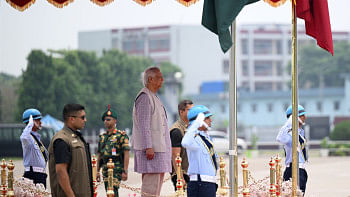Writ for Ban on Al Jazeera: 5 of 6 amici curiae against the plea

Five out of six legal expert amici curiae (friends of court) yesterday told the High Court that the writ petition seeking a ban on the broadcast of Al Jazeera and removal of its report "Al the Prime Minister's Men" from digital platforms was unacceptable.
Since there is no allegation of violation of fundamental rights because of the Al Jazeera report, the writ petitioner has no logical reason to be aggrieved and move the petition, they said.
The petitioner has not served any legal notice to the government demanding steps to this effect and a decision to block or restrict Al Jazeera may tarnish freedom of speech and freedom of press in Bangladesh. Besides, the laws of the land are not enforceable to restrict freedom of speech outside the country, according to their opinions.
The amici curiae have placed at the HC the legal and constitutional interpretations and examples of decisions of courts from home and abroad and the possible consequences of banning the broadcast of Al Jazeera in Bangladesh.
The five experts are, former attorney generals AJ Mohammad Ali and Fida M Kamal, and senior lawyers Kamal Ul Alam, Probir Neogi and Dr Shahden Malik.
The other expert Abdul Matin Khasru did not clearly state his opinion on the acceptability of the writ petition, but said the HC could order the government over the issue if it felt necessary because the video documentary was an attack on the prime minister, the army, and the integrity and solidarity of the country.
After hearing the opinions, the HC bench of Justice Md Mozibur Rahman Miah and Justice Md Kamrul Hossain Mollah fixed Wednesday for resuming hearing on the petition.
Attorney General AM Amin Uddin will present arguments on the petition on Wednesday.
At yesterday's hearing, AJ Mohammad Ali told the court that the authorities concerned of the government may request the Bangladesh Telecommunication and Regulatory Commission (BTRC) under the Digital Security Act to delete or remove any content from the digital platforms if they feel the content is a threat to the security of the state.
The authorities concerned of the government and army have issued separate responses to the Al Jazeera report.
AJ Mohammad Ali said the constitution guarantees freedom of expression and the court may not interfere in this.
He presented copies of rejoinders to the Al Jazeera report issued by the authorities and stated his legal interpretations before the HC bench.
Fida M Kamal told the court that the director general (DG) of the digital security agency and the inspector general of police (IGP) could request the BTRC to stop publication or broadcasting of any information and content from the digital media under section 8 of the Digital Security Act.
The BTRC can then delete or remove those from the platforms, he said.
"I don't know whether the government has taken such a decision in this regard," Kamal said.
The writ petitioner could have approached the DG or the IGP through serving a demand of justice notice, but he had not done this.
A writ petition can only be moved before the HC under Article 102 of the constitution seeking necessary directive if any question of action or inaction from the authorities concerned of the government is raised, but no such question is present in the issue, he said.
Under the constitution, a person must have grievances to move a writ petition before the HC, he said, adding that that was not the case here.
Lawyer Kamal Ul Alam told the HC that the writ petitioner was not someone aggrieved by the content of "Al the Prime Minister's Men".
There is no logical reason for the petitioner to be aggrieved, he said, adding that the petition has no mention of violation of fundamental rights.
Kamal observed that the writ petition could have been filed after serving a demand of justice notice within 10 days of the release of the Al Jazeera report.
The name of Prime Minister Sheikh Hasina was cited in the hour-long report and allegations were made, he said.
If the democratically elected head of a state is made controversial, the state is made disputed, he added.
The writ petition is not acceptable, he said.
Probir Neogi expressed the same opinion and said 10 days were enough for the petitioner to serve a demand of justice notice to the government authorities.
Eminent lawyer Dr Shahdeen Malik told the HC that the petition does not make out a case for mandatory actions by the DG of Digital Security Agency and the IGP.
"In view of the admitted fact that umpteen people have already accessed the documentary, blocking it may not serve any useful purpose at this belated stage as people will continue to have access to the documentary or report outside Bangladesh and our laws may not be enforceable in restricting freedom of speech and expression outside Bangladesh," he said.
A belated order at this stage upon the BTRC to block or restrict access to Al Jazeera, YouTube, Facebook, Twitter, and Instagram may end up tarnishing the regime of freedom of speech and freedom of press in Bangladesh.
The HC bench on February 10 questioned the acceptability of a writ petition filed by Supreme Court lawyer Anamul Kabir Emon seeking a ban on the broadcast of Al Jazeera and the removal of its report "Al the Prime Minister's Men" from digital platforms, and wanted to hear opinions from the six legal experts.

 For all latest news, follow The Daily Star's Google News channel.
For all latest news, follow The Daily Star's Google News channel. 



Comments